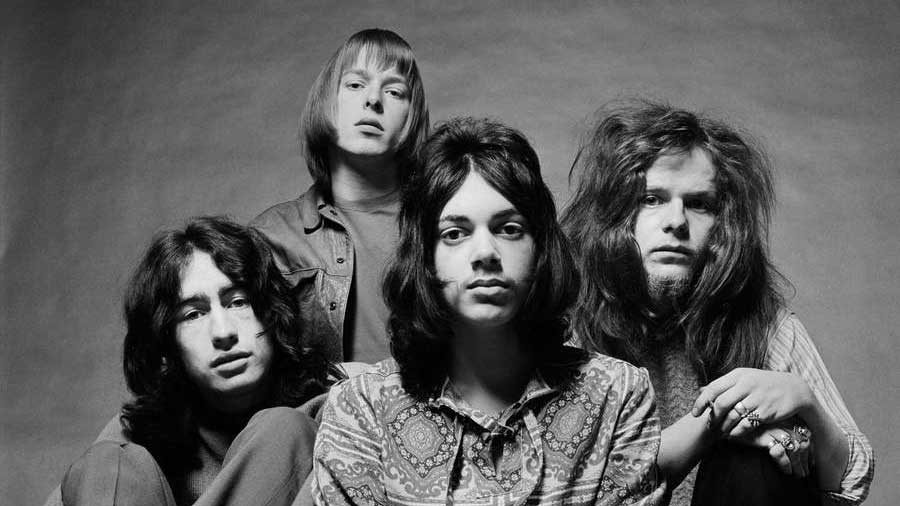1970 was a time when all the clocks had stopped. After the technicolour explosion of Sgt Pepper and the rest, it felt like someone had turned the colour right back down. It wasn’t just TV that was black and white, it was everything. The politicians, the football, the fashions, even the sky, smudged as it still was by a thick tar of coal and cigarette smoke.
The only place where anything new and truly colourful was taking place, it seemed, was music. But even there the clock appeared to be running down. The big event of the summer was the third Isle of Wight festival. Held in August 1970 it starred Jimi Hendrix, The Doors, The Who and a relatively new British blues rock band called Free, then enjoying the big rock hit of the summer with the single All Right Now, taken from their glorious third album Fire And Water.
“We’d only just broken through, in terms of having hits,” recalled their bassist and co-founder Andy Fraser when he and I spoke in 2014. “Suddenly we were on the same bill as all these superstar acts. But we knew how good we were. That on our day we needn’t be afraid of anybody.”
A month later Hendrix was dead, and six weeks after that Jim Morrison had given his last performance with The Doors. The Beatles had also officially announced their break-up that year, and Janis Joplin and Brian Jones were already long in their graves. Even Free, for whom the success of Fire And Water that year had offered so much future promise, were now flailing as they struggled to make a follow up to their masterpiece.
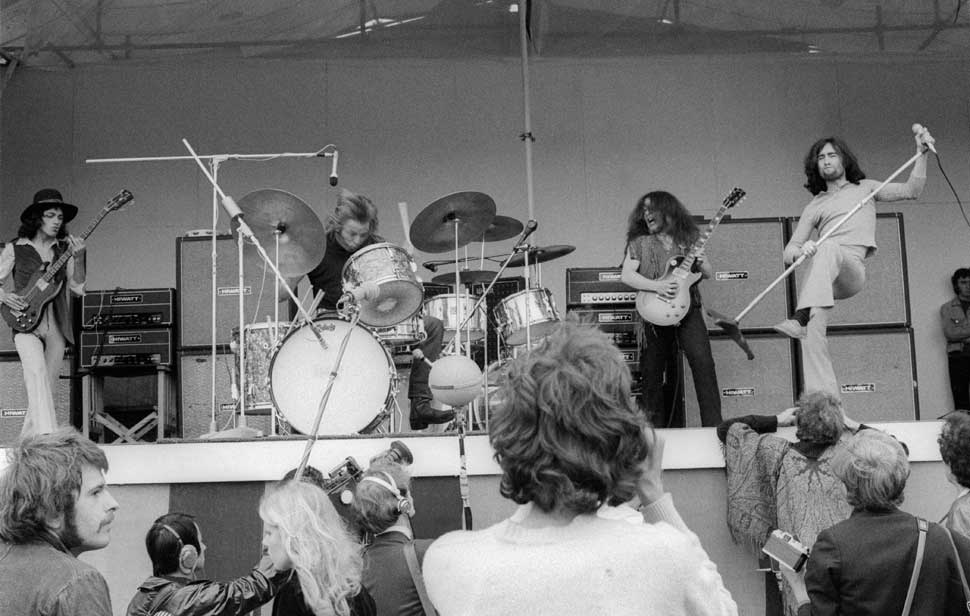
“We had the whole world in the palm of our hands in 1970. That’s what it felt like,” says drummer Simon Kirke now. “And we let it blow away.”
It’s true. They were impossibly young, stunningly talented, good looking in that rough-arsed, soulfully ungroomed way. Yet if any blues rock band of the era really had been born under a bad sign that band was surely Free. With Fire And Water they had created something beyond even what Led Zeppelin were attempting. Not just the latest hot-shot record, but a work of such mature and delicately balanced musical logic – combining blues and soul and rock and funk with something the four members of the band could only attribute to some spectral, infinitely wiser ‘fifth member’ – that the whole world immediately fell into a swoon over it.
It was a dream album, for sure, but Fire And Water was also the moment things turned inexorably into a nightmare for Free. Where it should be hailed as one of the greatest albums of its time today, instead it’s a footnote in the history books, overshadowed by its biggest single.
“It’s a crying shame what happened to Free after Fire And Water,” Andy Fraser would tell me years later. “But the music will always be out there. It was made to be that way.”
It certainly was.

Although All Right Now became the entry point into the Free story for many, it was actually the last track they’d recorded for the album it would eventually close. Fire And Water itself was released in June 1970, just as the single was being kept from the No.1 spot in the UK chart by Mungo Jerry’s In The Summertime. “God, I hated Mungo Jerry,” says Kirke, laughing. But where Mungo Jerry was, at best, a novelty act, Free suddenly found themselves part of the new rock royalty. Fire And Water, which also reached No.2, saw to that.
“There’s no doubt in my mind, Fire And Water was the pinnacle of Free,” says Kirke, down the line from his home in New York. The rangy, outspoken drummer was born in London but brought up in Shropshire, and still describes himself and Free singer Paul Rodgers as the “country boys” of the group. It’s no coincidence that they were also the two who came out of Free most successfully, going on to form the infinitely more commercially successful Bad Company.
“The other two had so much musical talent,” he says, referring to Fraser and guitarist Paul Kossoff. “But me and Paul had the drive and determination, I think. We were very gritty about it.”
While success would be greeted with ambivalence by Fraser – “I wanted to turn down Top Of The Pops. I just couldn’t see us on the same stage as some band like The Sweet,” he told me – for Kirke success was what it was all about: “Coming out of a gig and finding the Transit covered in phone numbers written in lipstick. Our driver would be scrubbing them off and we’d be writing them down on a piece of paper. No cell phones back then, you’d have to find a threepenny bit coin for the phone box. It was a lovely time. But that’s also when it all started going tits-up.”
Paul Rodgers, the down-to-earth son of a Middlesbrough docker, also coveted big-time success – but strictly on his terms.
“Life in London in 1970 was incredibly exciting as a kid from the north-east,” recalls Rodgers now, speaking from the US. “There seemed to be music everywhere. I could hear Cream, Hendrix, The Beatles, Joe Cocker or the Stones coming out of every window.”
Rodgers describes meeting Paul Kossoff as a “life-changing” experience. “We shared a deep love of the blues and were listening to the same records even before we met – BB King’s Live At The Regal, Albert King’s Born Under A Bad Sign, and others.”
Yet Kossoff, even younger than Rodgers, could not have been more different from the singer. The son of actor David Kossoff, he had been privately educated – until he was thrown out of school after being caught taking pep pills. “I think he was attracted to danger,” Kossoff Sr later recalled.
By the time he joined Free in 1968, Kossoff was part of a generation of brilliant English blues guitarists. Unlike the flash riff merchants starting to emerge as the 60s turned into the 70s, Kossoff was all about the feel. Rodgers recalls how his bandmate always played through a Leslie speaker, which is what gave him that sweeping, ‘organ’ sound. “He played every note like his life depended on it,” says the singer. “Now all of a sudden it really did. He was just way out there.”
“I like it when the music is moving in slow waves… rising and falling,” Kossoff said in 1973. Away from the music, however, Koss, as he was known, found his slow-moving waves in other, more prosaic ways. Mandies, downers, and eventually smack – when Kossoff died of a heart attack aged just 25, in 1976, it did not come as the biggest surprise to those who knew him.
Andy Fraser, who Koss found through an ad in the window of the Nag’s Head, a London pub venue specialising in blues, was the youngest and hippest member of the nascent Free. He was just 15 when he joined the band, though he had already earned his spurs playing with John Mayall.
Classically trained, adept at bass, piano, guitar and vocals, Fraser was the son of a black Guinean-Scottish father and a white English mother, who split up when Andy was just six. Brought up in 1950s London, Fraser was forced to grow a thicker skin than most, as playground taunts of “nigger” became a daily burden. Like Rodgers, he was short and skinny yet he kept his hippy-minded ways alive beneath a granite-tough exterior. Neither man suffered fools; arguments were often. Yet peace always broke out when they were playing together.
“Myself and Andy started writing together in earnest from then on,” says Rodgers. “Fire And Water was a song I wrote and Andy arranged. Heavy Load, Andy came to the studio with the music, and I wrote the melody and lyrics in the studio. We shared writing credits on all the songs we came up with.”
“Paul was really good on lyrics and coming up with a vocal melody, and my strength was structuring everything,” Fraser told me, characterising Rodgers as the fiery, sometimes brusque Sagittarian, and himself as the over-sensitive, watery Cancerian. “We were yin and yang. When it worked, it worked spectacularly. But when it didn’t…”
I first got to know Andy Fraser writing about Free for this magazine. Unlike most musicians, Andy liked to stay in touch. As well as various magazine, radio and TV interviews we did over the years, he would email in or ask to Skype, keeping me abreast of his various solo projects. At some point he casually dropped into the conversation that he had been diagnosed HIV-positive some time earlier.
As his former bandmates suggest, he was tough, wiry, caustic sometime, but always in good humour. And he claimed to be happy with his lot: the secret ingredient in Free, whose fall from the glory days of Fire And Water to the shadows of semi-obscurity he considered a small price to pay for his own individual freedom.
“We knew he had a little bit extra going on when he turned up for the audition in a taxi,” recalls Kirke.
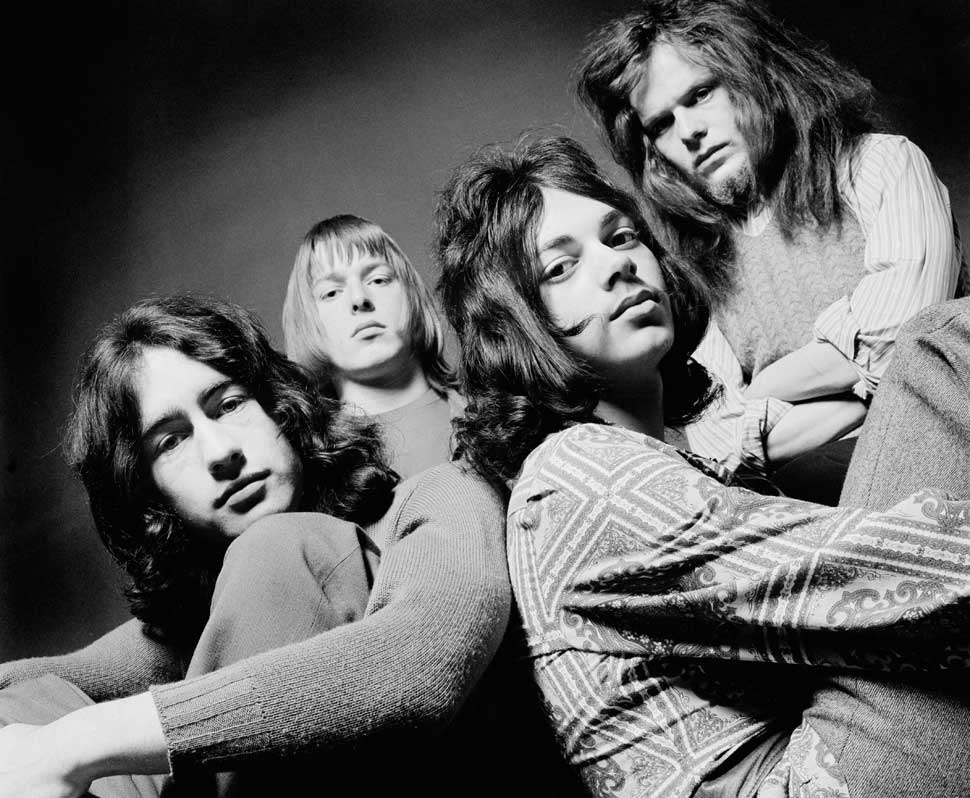
Free weren’t game-changers like The Beatles or trailblazers like the Rolling Stones; they didn’t trip out on godhead like Hendrix or hammer their blues influences into supersonic might like Led Zeppelin. Yet the music of Free encapsulated that early-70s milieu like no other British band of the time.
Although Fire And Water was the band’s third album, they had been together for only 18 months when they recorded it, over two separate sessions at the beginning of 1970. “It was always about making albums,” Fraser would tell me. “We didn’t even think about what might make a good single.”
They were a groove machine, their best music full of space and time and witchy moods. Listen now to Fire And Water and it’s all there on the monumental title track. Something about the magic blend of that slow-dancing-round-the-fire riff and frontman Paul Rodger’s gunslinger vocals that induce a trancelike state best absorbed – in 1970, anyway – by lying spliffed-out on the floor of some dank but cozy pad, incense burning, weak sunlight creeping past the hessian curtains; the sort of place where everyone was called ‘man’ and ‘baby’, and where now-distant concepts like ‘peace’ and ‘love’ held sway.
Yet music that sounded so at ease within its own skin had been come by only through sheer hard work. For the first Free album, Tons Of Sobs, released in March 1969, they essentially recorded their stage set.
“We’d record a few tracks,” says Rodgers, “go out and play some shows then come back to record some more until we had enough for an album.”
Kirke recalls weekly listening sessions at Andy Fraser’s mum’s house in Roehampton: “We always congregated every Monday night. We brought round albums that we thought the others would like. Andy had a really nice stereo system in his room. I still remember what it was: a Leak Stereo 30 Plus amp with a couple of Wharfedale speakers. This was really high-end stuff.
"We’d be sprawled on the bed or sitting on the floor, the four of us, smoking a bit of dope, and we’d really listen. My god, I wish I had a photo from those days. We’d listen to The Band, Isaac Hayes. We listened to Motown, Otis Redding. I believe we even listened to a bit of Mozart once. It was just bouncing what we liked off the other three people. And I really believe that cemented us as musical brothers. It wasn’t strictly blues-slash-rock, there were always other elements involved.”
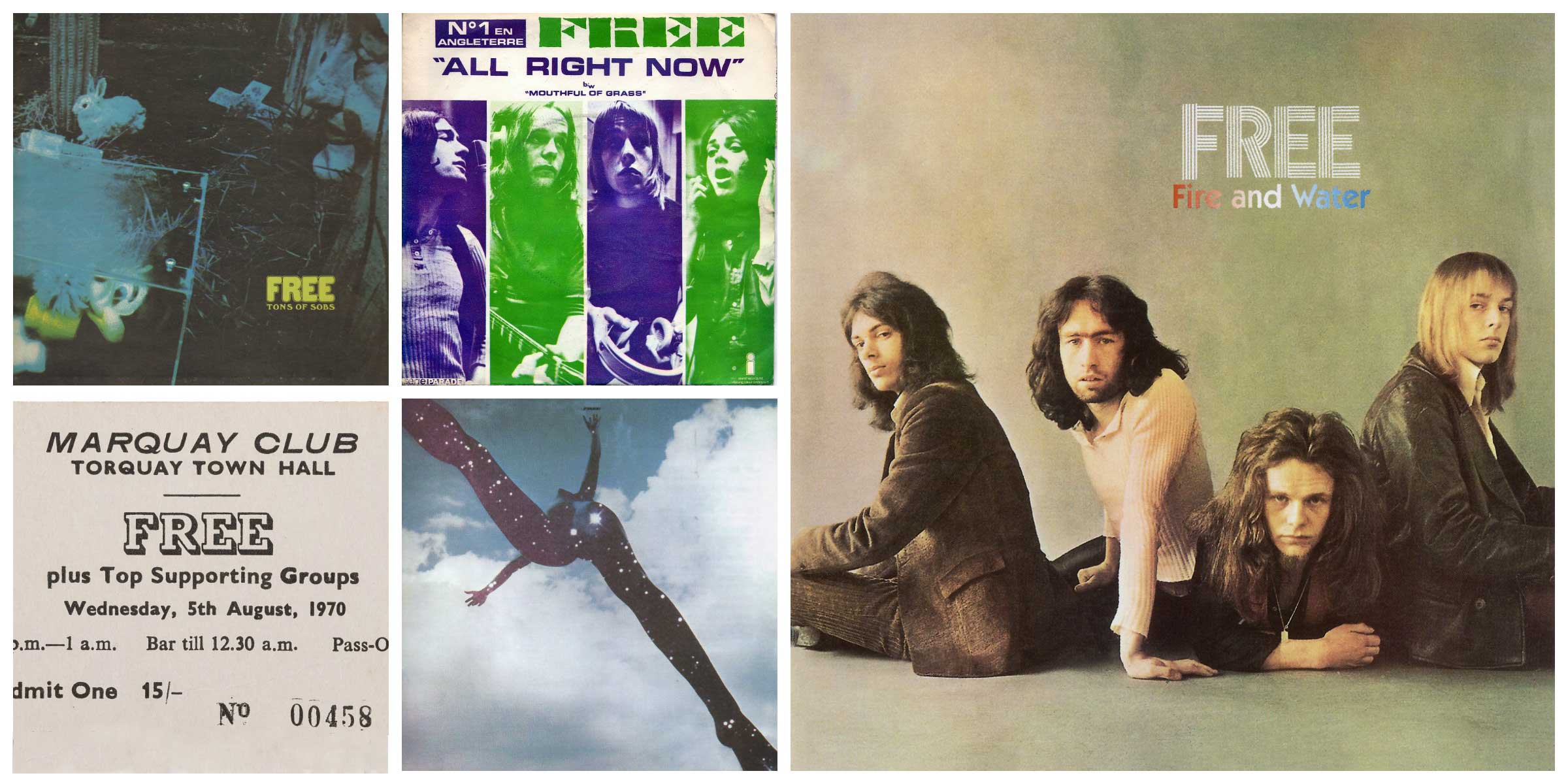
Their second album, simply titled Free, and released just five months later, was made in the same catch-as-catch-can style: sessions recorded ad hoc between live dates. But while the band’s live reputation grew – “We were working all the time,” recalls Kirke – neither album was a significant hit.
But it was now that the songwriting partnership that would turn Free into one of the great bands of the era began to blossom: that between the 21-year-old Rodgers and the 17-year-old Fraser.
In keeping with their self-styled image as freewheeling jack-the-lads, it was only after the singer caught the clap from “a hooker I was living with off the Portobello Road” and was forced to rest up for several weeks while he received treatment, that he and Fraser found the time to develop as songwriters.
One of the first numbers they worked up together like this was the song Fire And Water. Suddenly Free’s faithful bluesology was transformed into something more original, much deeper: something immortal. “Although we didn’t have much in common as people, we really clicked as songwriters together,” Fraser told me.
When it came to recording their third album, Free still did things on the hoof between gigs, flitting between recently opened Trident Studios, in Soho – where George Harrison was recording parts of his first post-Beatles album, All Things Must Pass – and Island’s Basing Street Studios in Notting Hill Gate, where Led Zeppelin were waiting to go in and record tracks for their own third album. This time, though, Free weren’t humble beginners hoping for the best. They’d earned their spurs as a live act in every club and student union hall in the country. Now they were ready to step up in the studio.
“By then we’d learned to make the music breathe, how to go with the flow and let the music dictate its own natural speed,” Rodgers told me in 2006. “We’d become confident enough to let things happen organically. I knew Koss wouldn’t play all over my singing, and the band knew I was listening to them just as intently. We were all immersed in the music. That thing that happened when the four of us got together at our best.”
“Andy and Paul did the writing,” says Kirke, “me and Koss did our thing. But on stage we were one. I always said when the band really got it together and got flying, there was a fifth member playing with us. He was certainly there on those Fire And Water sessions. There was no crowding each other. It all just felt natural. Since 1968 we’d done literally hundreds of gigs. We were so tight. Fire And Water was the culmination and the apex of the tightness that Free became. After that things started to go downhill. Thanks in part to All Right Now.”
For most Free fans in 1970, All Right Now was where that vital fifth member first came to the fore in spectacular fashion. “The minute [Island Records chief] Chris Blackwell came into the studio and heard it, he said: ‘That’s a hit,’” Kirke recalls. “We all went: ‘Wow!’ Then he said: ‘But it’s too fucking long.’”
All Right Now was possibly the first truly post-modern song in rock – that all-too knowing line about ‘trying to trick me in love’ was an admission of pragmatism in a world still echoing to the sound of love being all you need. More importantly, it had the greatest, most catchy riff ever written.
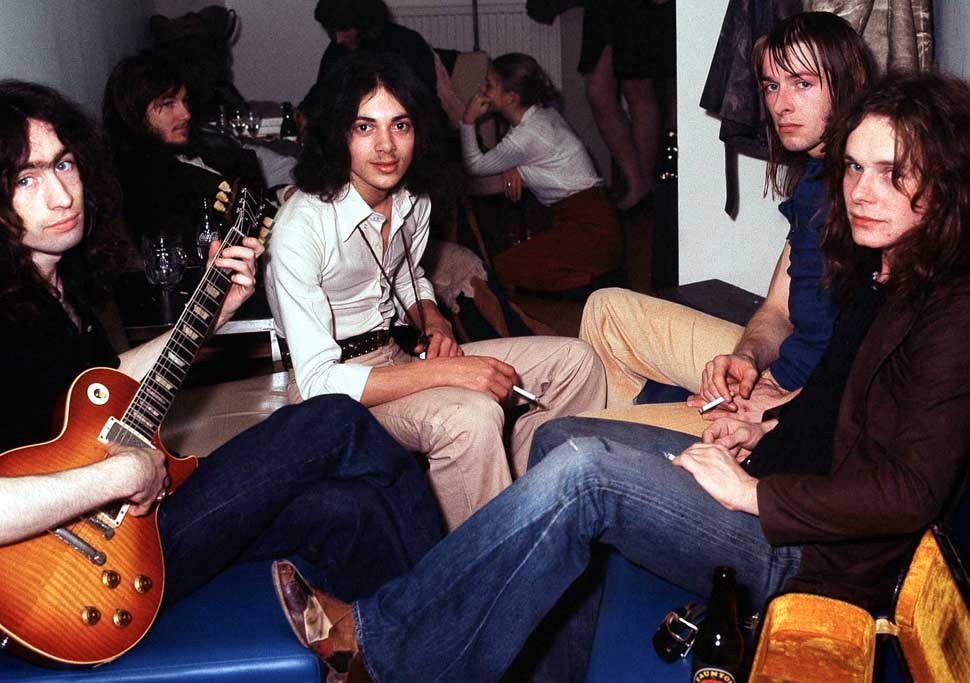
But Blackwell insisted that for a single-sized version they would have to cut the third verse and trim down the Paul Kossoff guitar solo. Sacrilege, in the eyes of a still idealistic young band, until Blackwell edited the song down by almost a minute-and-a-half and played it to them. “You can still hear the place he cut it,” says Kirke. “But we had to admit it worked, in terms of turning it into something the radio would play.”
Indeed it did, as evidenced by the astonishing success of the single, which went to No.1 in more than 20 countries, including a top-five placing in America, where it would be played on the radio over a million times over the next two decades. (Current 21st-century estimates have that figure at over seven million.)
Rodgers recalls receiving the phone call that changed his life. “It was about ten in the morning. It was Denise, the secretary at Island. She said: ‘You’ve got to come over now. It’s All Right Now, it’s come in the charts at number four!’ I’m like, what? The part that really made me think we’ve made it though was when she said: ‘Get in a taxi now – and get a receipt, we’ll pay you back!’ I floated down those stairs – seventy-eight steps, I’ll never forget it.”
In spite of this huge success, unlike most rock bands (now even more than back then) Free never restricted themselves to a ‘lowest common denominator’ template. “Our attitude was: we’re not playing your game,” Fraser explained. “We’re playing our game. We’d listen to Led Zeppelin, and Robert Plant would be screaming away and we’d be like: ‘Couldn’t he think of some lyrics?’ We looked up to Cream and Hendrix, we loved The Beatles. But we mainly were influenced by black American performers like BB King and Aretha Franklin, Gladys Knight and Otis Redding. Those sorts of people were really what we were listening to.”
That deep soul influence is felt all across the Fire And Water album. While the heavy beating heart of their music can be heard most clearly on scene stealers like the spaced-out Heavy Load, or the chair-pushed-back scowl of Mr Big, their gospel is felt most deeply on the joyously elegiac Oh I Wept and the sweet rush of Don’t Say You Love Me. When Wilson Pickett, whose 1965 smash In The Midnight Hour had long been in the Rodgers repertoire, covered Fire And Water, taking it to No.2 in the US Billboard R&B chart in 1971, it vindicated Free’s suggestion that skinny white boys could not only sing the blues but had plenty of soul power too.
But what you heard most on Fire And Water wasn’t so much different styles of music as whole new ways of life. Free’s brief but glorious reign may have coincided with loon pants and lava lamps, with joss sticks and bra burning, with weed and wine and acid, but what they really stood for in the blown minds of those of us who bought their LPs was spelled out in their very name: freedom. Freedom from that black-and-white world of the early 70s; escape to a land where long hair still meant something. Something free.
It’s bitterly ironic, then, that the success of All Right Now seemed to rob Free of that musical freedom. “All Right Now really was an albatross,” sighs Kirke. “What’s that old Chinese saying: be careful what you wish for? And we got it. Suddenly, instead of playing a different town every night we were playing a different country.”
Tours of America, Japan, Australia, and that landmark Isle of Wight appearance, all seemed to mark the rise of a band that was actually in free-fall. When they tried to make a plausible follow-up to All Right Now they couldn’t pull it off. Their next single, The Stealer, recorded in double-quick time in September 1970 and eventually featured on their fourth album, Highway, was a great song in its own right, but it was an absolute flop.
“The pressure was on to come up with a follow-up to All Right Now, and we just couldn’t,” says Kirke. “The Stealer died a death and Highway went the same way. We were really glum about that. That’s when Andy and Paul thought, well, we’ve reached the end of our musical journey together, let’s split up. I’ll never forget Koss’s reaction. He slumped like he’d been hit in the stomach.”
For Fraser, the restraints had been applied even while All Right Now was thrusting Free into the bright sunshine during that fleetingly glorious summer of 1970, when colour had briefly flooded the world again. “We were no longer a very tight-knit bunch of commandos watching each other’s backs,” he said. “The intimacy we shared as four guys was now being shared with girlfriends and wives. So that fifth member that was bigger than all of us sort of left and the basic chemistry of the band started to unravel.”
Free split early in 1971, but it wasn’t quite the end of the story. A year later they re-formed, partly in an ultimately doomed attempt to help the ailing Kossoff. The original line-up made one more album, Free At Last, almost grudgingly recorded, at the start of 1972. But the good times had long-since stopped rolling, as evidenced first by Fraser’s departure not long afterwards and, more tragically, by the ugly descent into drug-induced hell that hounded Kossoff all the way to his premature grave three years later.
Over the next 40 years and more, Free’s standing as one of the defining bands of rock’s adolescence faded, and Fire And Water was unjustly remembered, if at all, as the album with All Right Now on it. A handful of Free devotees – chief among them Joe Bonamassa – kept their flame alive, but it flickered rather than blazed. In recent years there were constant rumours of a reunion, most notably as part of the celebrations for the London Olympics in 2012, but old strains resurfaced and it all came to nought. Sadly Andy Fraser died on March 16, 2015, and with him vanished any last prospect of his former band regaining its rightful place in rock’s pantheon.
The last time I spoke to Andy Fraser, he spoke with a mixture of disappointment and frustration at his old band’s unfulfilled promise. “After Fire And Water, I think we could have reached for some even greater horizons,” he said. “When I think of The Beatles, they weren’t scared to go anywhere, from silly Yellow Submarine-type songs to Strawberry Fields Forever, which is a total classic. And I felt we had that ability too. I didn’t want to be restrained into being this simple blues band.”
Ifs, buts, maybes… All too late now to do anything about; all, ultimately, dust in the wind. The only thing that actually matters is the music. Listen to Fire And Water now and what you hear isn’t really about 1970 at all. It’s about now and then and the future. It’s about that timeless thing that happens when your soul is touched by beauty. By sun and moon. By yin and yang. By fire and water. Free may have missed out on the legacy they truly deserved, but for the rest of us Fire And Water is still waiting: a magic gateway to that place where it will always be all right now, baby.
This feature originally appeared in Classic Rock 210, published in June 2015.
